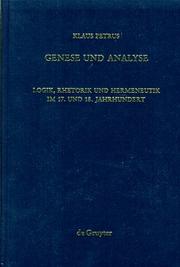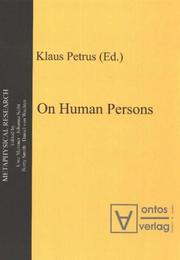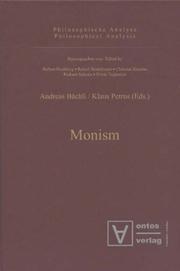| Listing 1 - 10 of 17 | << page >> |
Sort by
|
Book
ISBN: 9780230579088 0230579086 1349367737 9786612997105 0230282113 1282997106 Year: 2010 Publisher: New York, N.Y. Palgrave Macmillan
Abstract | Keywords | Export | Availability | Bookmark
 Loading...
Loading...Choose an application
- Reference Manager
- EndNote
- RefWorks (Direct export to RefWorks)
Grice, H. Paul --- Language and languages --- Philosophy. --- Grice, H. P.

ISBN: 3110153947 3110820439 9783110153941 Year: 2013 Volume: 43 Publisher: Berlin ; Boston : De Gruyter,
Abstract | Keywords | Export | Availability | Bookmark
 Loading...
Loading...Choose an application
- Reference Manager
- EndNote
- RefWorks (Direct export to RefWorks)
Logic --- Rhetoric --- Hermeneutics --- History --- Interpretation, Methodology of --- Criticism --- Language and languages --- Speaking --- Authorship --- Expression --- Literary style --- Argumentation --- Deduction (Logic) --- Deductive logic --- Dialectic (Logic) --- Logic, Deductive --- Intellect --- Philosophy --- Psychology --- Science --- Reasoning --- Thought and thinking --- Methodology --- Logic - History - 17th century. --- Logic - History - 18th century. --- Rhetoric - History - 17th century. --- Rhetoric - History - 18th century. --- Hermeneutics - History - 17th century. --- Hermeneutics - History - 18th century.

ISBN: 3110324652 3110324644 9783110324648 9783110324396 3110324393 3937202315 9783937202310 1904632203 9781904632207 9783110324655 Year: 2003 Volume: Bd. 1 Publisher: Frankfurt Ontos Verlag
Abstract | Keywords | Export | Availability | Bookmark
 Loading...
Loading...Choose an application
- Reference Manager
- EndNote
- RefWorks (Direct export to RefWorks)
There is no question: We are all persons. But what exactly are persons? Are we immaterial souls or Cartesian Egos which only contingently have bodies? Or are persons nothing over and above their bodies? Are they essentially or most fundamentally animals, evolved beings of a certain sort? Or are we something other or more than animals, namely constituted beings with a certain capacity that distinguishes persons from everything else? What is necessary, and what is sufficient, for an entity to be classified or (re-)identified as a person? What's the value of an analysis of such (biological or psychological) conditions? What does it contribute to our understanding of ourselves as free agents or as beings wanting to live their individual live? The essays collected in this anthology try to answer these questions. They are primarily concerned with the metaphysics of persons and the criteria of personal identity, but also touch on problems of the theory of action and of practical philosophy.
Metaphysics. --- Philosophy --- God --- Ontology --- Philosophy of mind --- Metaphysics --- Philosophical anthropology
Digital
ISBN: 9783110820430 9783110153941 Year: 2013 Publisher: Berlin ;; Boston De Gruyter
Abstract | Keywords | Export | Availability | Bookmark
 Loading...
Loading...Choose an application
- Reference Manager
- EndNote
- RefWorks (Direct export to RefWorks)
Book
ISBN: 3839422329 3837622320 9783837622324 Year: 2015 Publisher: Bielefeld transcript Verlag
Abstract | Keywords | Export | Availability | Bookmark
 Loading...
Loading...Choose an application
- Reference Manager
- EndNote
- RefWorks (Direct export to RefWorks)
Unsere Beziehung zu den »anderen« Tieren gewinnt nicht bloß mehr und mehr an gesellschaftlicher Bedeutung, sie ist auch für die Wissenschaften wieder zum Thema geworden. Mit diesem Band widmet sich zum ersten Mal ein Lexikon umfassend den Mensch-Tier-Beziehungen. Im Gegensatz zu traditionellen Einführungen in die Tierethik beschränkt sich das groß angelegte Werk aber nicht auf moralphilosophische Themen, sondern beleuchtet die Mensch-Tier-Beziehungen u.a. auch aus historischer, soziologischer, ethologischer und kulturwissenschaftlicher Perspektive. »Das ›Lexikon der Mensch-Tier-Beziehungen‹ stellt [...] ein nützliches Instrument für alle an den Animal Studies Interessierten zur Verfügung und verdient es, eine breite Leserschaft auch außerhalb der Human- und Lebenswissenschaften zu finden.« Madalina Diaconu, polylog, 4 (2017) »Der Sammelband-Charakter führt zu einer ideologischen Vielfalt.« Tobias Sennhauser, www.tier-im-fokus.ch, 24.09.2016 »Das umfangreiche Buch richtet sich mit seinen fast durchgängig luziden Argumentationen [...] sowohl an Spezialisten und Forscher als auch an Aktivisten, Politiker oder allgemein Interessierte. So kann man dieses Lexikon als ein Füllhorn der Informationen und Anregungen tatsächlich so ziemlich an jeden weiterempfehlen. Man wünscht dem verdienstvollen Werk viele Leser und dem Thema weiter wachsende Aufmerksamkeit.« Bernd Blaschke, www.literaturkritik.de, 16.09.2016 »Das Lexikon [vermittelt] einen tiefgreifenden Einblick in den aktuellen Stand der Debatten im Feld der Human-Animal-Studies.« GID - Gen-ethischer Informationsdienst, 237 (2016) »Für all jene, die sich [...] aus akademischem oder privatem Interesse mit dem wissenschaftlichen Diskurs rund um Human-Animal Studies und Veganismus auseinandersetzen möchten, bietet dieses Buch einen idealen Überblick.« Patrick Zeitlhuber, https://vegan.at, 25.07.2016 »Das Lexikon macht [...] gleich mehrere Angebote, die es für Forschung und Lehre in allen mit Mensch-Tiere-Beziehung beschäftigten Feldern empfehlen: Es bietet Orientierung und informiert kurz, knapp und verständlich über zentrale Problemfelder, Themen und Wissensbestände im Kontext der HAS. Zugleich fordert es seine Rezipient/innen zur kritischen Lektüre heraus und erzeugt dabei bisweilen auch Widerspruch und Reibung.« Michaela Fenske, H-Soz-u-Kult, 24.06.2016 »Vom Problem des ›Animal Hoarding‹ über das scheinbar simple ›Ei‹ bis zum ›Tierkult im pharaonischen Ägypten‹ wird dem Leser ein durchweg ambitioniertes Lexikon präsentiert, das in keiner gut sortierten Bibliothek fehlen sollte.« Kirstin Zeyer, Coincidentia, 6/2 (2015) »Das Lexikon erfüllt [...] einerseits den anvisierten Zweck der übersichtlichen Einführung in die diversen Themenbereiche innerhalb der Human-Animal Studies und dient andererseits auch als Inspiration zu weiterführender und vertiefender Lektüre anhand nützlicher Literaturverweise. Nicht bloß für jene Menschen zu empfehlen, die sich noch relativ wenig mit den vielseitigen Mensch-Tier-Beziehungen befasst haben. Auch für viele Expert*innen in einem der vielen Felder der Human-Animal Studies lohnt sich das Lexikon als Möglichkeit, über den methodologischen und inhaltlichen Tellerrand hinaus zu blicken.« Florian Leonhard Wüstholz, TIERethik, 12/1 (2016) »Auf der Grundlage eines avancierten Theoriedesigns im Bereich der animal studies [...] erhält der Nutzer [...] einen sehr guten Einblick in alle wesentlichen Bereiche des Themas. Es [ist] eine Stärke des Lexikons, dass die jeweiligen Begriffe übersichtlich entfaltet und kontextualisiert, kontroverse Diskussionen nachvollziehbar dargestellt und bewertet werden.« Till Kinzel, Informationsmittel (IFB), 3 (2016) »Dieses Lexikon sollte in keiner Bibliothek und in keiner Schule fehlen.« Kochen ohne Knochen, 1 (2016) »Ein wertvolles Buch, hilfreich für alle, die sich mit Tierrechtsthemen tiefer befassen.« anima, 31/4 (2016) Besprochen in: http://www.fellbeisser.net, 06.10.2015, Volker Wöhl greenpeace magazin, 3-4 (2016) Offene Spielräume, 1 (2016) Kunstbulletin, 4 (2016) Mensch&Tier, 1 (2016) Stiftung Bündnis Mensch & Tier, 4 (2016) www.lehrerbibliothek.de, 25.01.2016, Dieter Bach Tierstudien, 10 (2016), Julia Eva Wannenmacher www.sehepunkte.de, 17/3 (2017), Markus Krzoska Interdisziplinäre Anthropologie, 4 (2016), Andreas Vieth Soziologische Revue, 43/2 (2019), Rainer E. Wiedenmann
Human-animal relationships --- Animal-human relationships --- Animal-man relationships --- Animals and humans --- Human beings and animals --- Man-animal relationships --- Relationships, Human-animal --- Animals --- Mensch-Tier-Beziehung; Human-Animal Studies; Tierethik; Tierphilosophie; Tierschutz; Tierrechte; Kulturphilosophie; Tier; Mensch; Tiergeschichte; Kulturwissenschaft; Animal Philosophy; Philosophy of Culture; Animal; Human; Human Animal Studies; Animal History; Cultural Studies --- Human-animal relationships - Encyclopedias --- Animal History. --- Animal. --- Cultural Studies. --- Human Animal Studies. --- Human. --- Philosophy of Culture.
Book
ISBN: 3839424623 Year: 2014 Publisher: Bielefeld transcript Verlag
Abstract | Keywords | Export | Availability | Bookmark
 Loading...
Loading...Choose an application
- Reference Manager
- EndNote
- RefWorks (Direct export to RefWorks)
Animal minds and animal ethics - different origins, connecting similarities. Philosophers working on questions of animal ethics usually draw on research into animal cognition and subscribe to strong positions regarding animal minds. Whereas philosophers interested in the question of animal minds sometimes draw ethical conclusions from the positions they argue for. In spite of such overlaps, these two areas of research have grown up separately. One reason for this separation stems from the institutional distinction between theoretical and practical philosophy. The principal aim of this anthology is to build bridges between the fields and different philosophical approaches of animal ethics and of animal minds and cognition. »Der Band zeigt, wie sich das dilettantische Zurechtschneidern des Geistes der Tiere verhindern lässt. Die Auswahl der Arbeiten [...] bezeugt das konstruktive Potential der postmodernen Philosophie.« Philipp von Gall, TIERethik, 6/8 (2014) »Ein lesenswertes Buch.« Kochen ohne Knochen, 15/2 (2014) Reviewed in: Fellbeißer, 10 (2013) www.lehrerbibliothek.de, 21.01.2014, Dieter Bach fair-fish, 13.02.2014, Heinzpeter Studer
Ethics; Animal Ethics; Animal Minds; Animal Cognition; Philosophy of Mind; Human-Animal Studies; Animal; Animal Philosophy; Philosophy; Cultural Studies; Human Animal Studies --- Animal Cognition. --- Animal Ethics. --- Animal Minds. --- Animal Philosophy. --- Animal. --- Cultural Studies. --- Human Animal Studies. --- Human-Animal Studies. --- Philosophy of Mind. --- Philosophy.
Book
Abstract | Keywords | Export | Availability | Bookmark
 Loading...
Loading...Choose an application
- Reference Manager
- EndNote
- RefWorks (Direct export to RefWorks)

ISBN: 3937202196 Year: 2003 Publisher: Frankfurt Ontos
Abstract | Keywords | Export | Availability | Bookmark
 Loading...
Loading...Choose an application
- Reference Manager
- EndNote
- RefWorks (Direct export to RefWorks)
Book

ISBN: 1501504231 9781501504327 1501504320 9781501504235 9781501512179 150151217X Year: 2017 Publisher: Berlin Boston
Abstract | Keywords | Export | Availability | Bookmark
 Loading...
Loading...Choose an application
- Reference Manager
- EndNote
- RefWorks (Direct export to RefWorks)
What methodological impact does Contextualism have on the philosophy of language? This collection sets out to provide some answers. The authors in this volume question three ultimately connected assumptions of the philosophy of language. The first assumption relates to the predominant status of referential semantics and its power to explain truth-conditional meaning. This assumption has come under attack by the context thesis and a number of papers pursue the question of whether this is justified. The second assumption gives priority to assertive sentences when considering language use. The context thesis changes our understanding of language use altogether; possible implications from this methodological shift are addressed in this volume. According to the third assumption, philosophical analysis amounts to nothing more than conceptual analysis. The context thesis risks undermining this project. Whether conceptual analysis can still be defended as a methodological tool is discussed in this volume.
E-books --- Context (Linguistics) --- Semantics. --- Formal semantics --- Semasiology --- Semiology (Semantics) --- Comparative linguistics --- Information theory --- Language and languages --- Lexicology --- Meaning (Psychology) --- Grammar, Comparative and general --- Situation (Linguistics) --- Linguistics --- Context --- Context Thesis. --- Contextualism. --- Philosophy of Language.
Digital

ISBN: 9781501504327 9781501504235 9781501512179 Year: 2017 Publisher: Berlin ;; Boston De Gruyter Mouton
Abstract | Keywords | Export | Availability | Bookmark
 Loading...
Loading...Choose an application
- Reference Manager
- EndNote
- RefWorks (Direct export to RefWorks)
| Listing 1 - 10 of 17 | << page >> |
Sort by
|

 Search
Search Feedback
Feedback About UniCat
About UniCat  Help
Help News
News